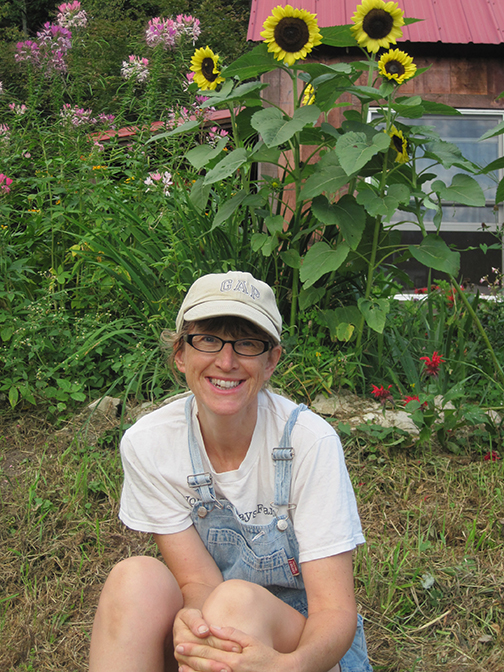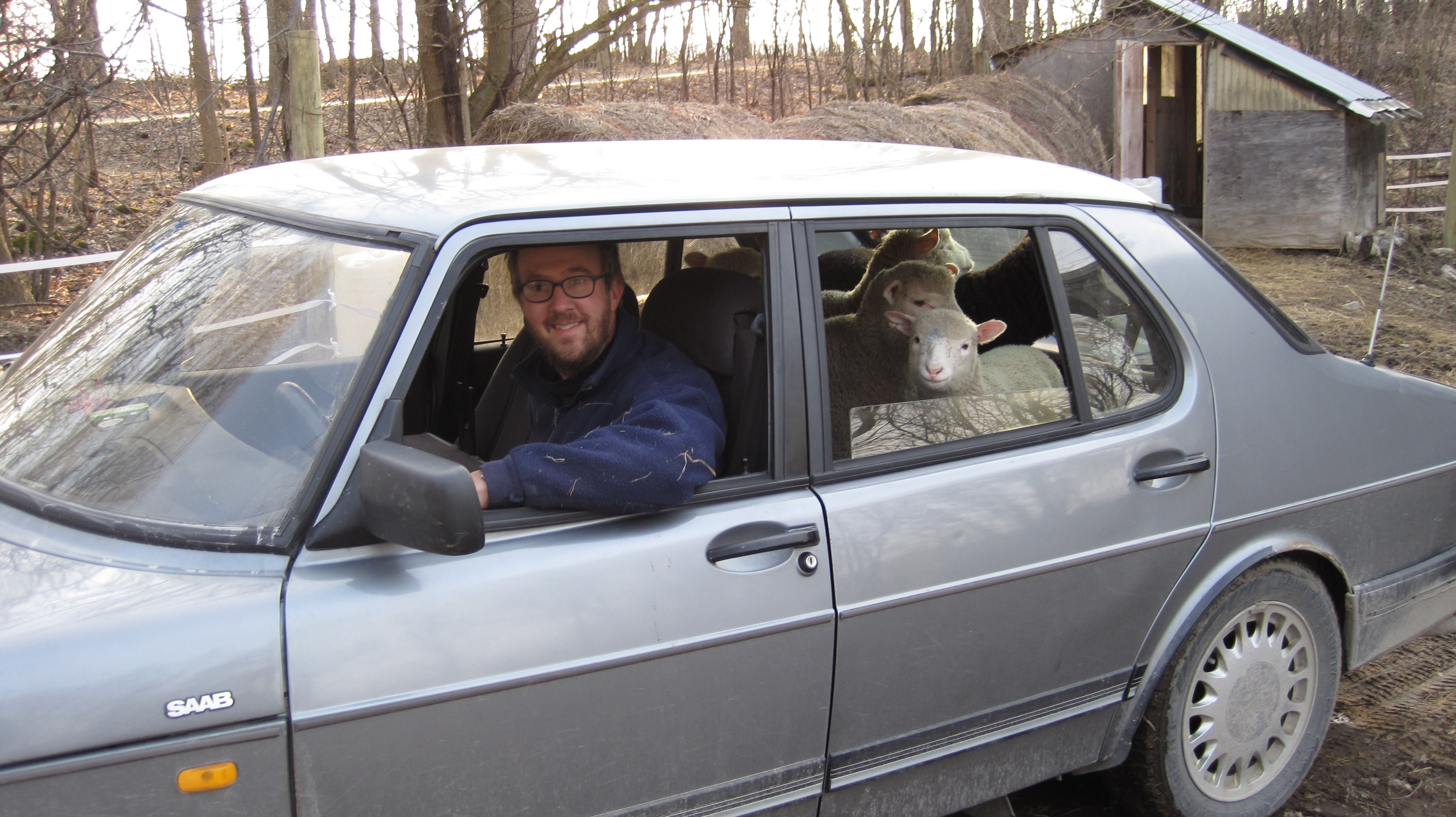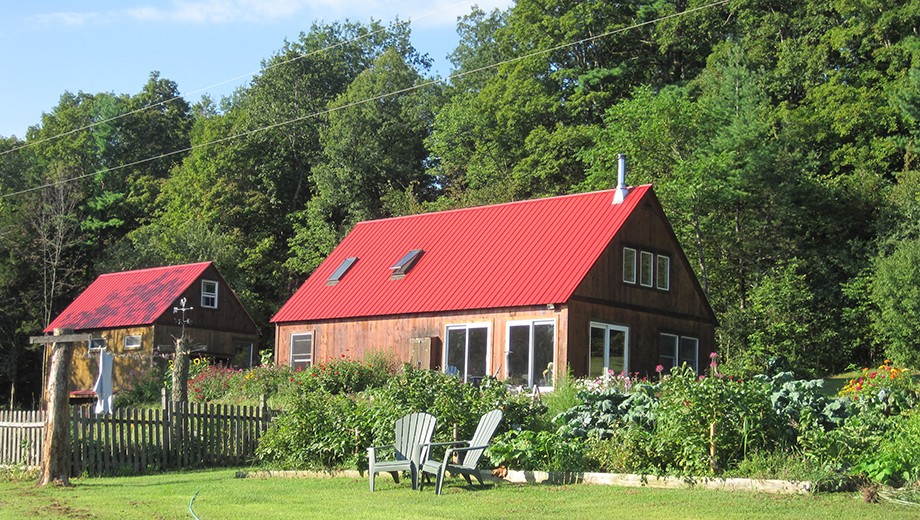For a classics professor, Mark Usher’s curriculum vitae is a little unusual. In addition to the accomplishments you would expect—education, teaching positions, academic publications, awards—he lists children’s books, opera libretti, and poems published in literary journals. Finally, under “other experience,” he explains that he is a “sheep farmer/ homesteader (we built our own house and outbuildings, raise market lambs, poultry, eggs, pork, and goats).” He also notes that he and his wife homeschooled their three sons.
How could he possibly find time for it all? I wondered, being one of those parents who sometimes can’t get it together to sign my kids’ homework or keep my window boxes watered. Usher’s explanation: “I have a heroic wife.” Caroline Usher manages their farm, Works & Days Farm in Shoreham, Vermont, and does most of the day-to-day labor. “You should be interviewing her,” Usher suggested. So I did.
Here are Mark and Caroline’s thoughts on farming, learning, and being uncompromising.
Whose idea was it to have your own farm?
Mark: We both always wanted to do this. We started out with [our children’s] home births, then homeschooling, then we built our own house. I was a hippie carpenter in Germany before I did my undergraduate degree, so I knew how to do that. We had no mortgage, which was wonderful. Right now we have 50 acres and we farm another 25.
It’s about the idea of self-reliance. You shouldn’t have to pay someone else to do it if you can do it yourself. Or maybe you should learn to do it yourself.
 Caroline: It just felt right. It seemed very natural.
Caroline: It just felt right. It seemed very natural.
How did you know what to do? Did you grow up on a farm?
Mark: I grew up as a young child on an old farm property in Belgrade, Maine. My parents didn’t work the land, but rented it out to a farmer for crops.
Caroline’s a city girl. She grew up in Manchester, England. But she just has a good sense about animal needs and signs of incipient distress or trouble, and about farm and garden management in general. She has also taken a couple of extension classes on pasture and parasite management, scoring sheep condition, etc.
Caroline: You start off small. You learn from your mistakes. We started off with three animals and we kept them alive. So I said, let’s get three more.
I read a lot. My kids were members of a fencing club, and the mothers would sit around during the class. Two of them were dairy farmers and one had goats as well. They put up with my endless questions. I did chores for people too. That’s a good way to learn.
How many hours a week do you spend doing farm work?
Caroline: It varies. Farming isn’t the same every day, every season, every year.
Milking goats is labor-intensive. You have to do that twice a day. For the daily chores, you feed the chickens, goats, turkeys, pigs, check on the sheep.
Then on the weekend we cram in the big chores—feet trimming for sheep, moving fence or hay. Lambing season is pretty intense. We always breed for the Easter market, so it’s usually in November or December. You try to check them first thing in the morning, 5:30 or 6:00. In winter you may have snowstorms or complications. It takes up a lot of your thought and time.
I try not to add up how many hours I work. It would probably work out to be ten cents an hour.
Do you have to buy groceries, or are you self-sustaining?
Caroline: We could be, if we wanted to. But once in a while you want those potato chips.
You married very young, right?
Mark: I was 20. She was 17. Her dad had to sign the paperwork.
Caroline: I got married a day before my eighteenth birthday. It was a technicality.
How did you meet?
Caroline: At an arts festival in Castle Ashby, Northhamptonshire, when I was 15. It was really a chance meeting. He was an American living in Germany and I was English.
Mark: I was traveling with my German friends. And I was sick of those friends and I was dying to speak English. I asked her what time it was and that was that.
Caroline: We wrote to each other for two years. Maybe we had a phone call every once in a while for five minutes, until my dad picked it up and said, “That’s long enough.” We’d seen each other in person for a total of four days before we got engaged.
You homeschooled your three sons with great success—the oldest went to Princeton, the middle to UChicago, and now the youngest is doing his senior year at Interlochen.
Mark: Caroline deserves all the credit for that. I did read their essays, help them with their writing. We did Latin when they were younger. I taught them to do some things around the house.
Caroline: My schooling experience in England was such that I could have left school after kindergarten without much lost. I didn’t want that for my kids. I wanted their education to be much more.
I didn’t even do A-levels [the English equivalent of the last two years of American high school]. I graduated high school at 16 with just some O-levels. I grew up in the 80s, with [Prime Minister Margaret] Thatcher, and there was massive unemployment. We never really thought about careers. So I didn’t go on to college or any higher education. You don’t necessarily have to go through education yourself in order to value it.
What was your homeschooling philosophy?
Caroline: I didn’t want education to be separate from life. There’s so much to learn, not just bookwork.
We did do bookwork. I made a curriculum. They had to cover certain subjects in the day. But they didn’t sit at a desk. And it changes over time too. When they’re little kids, they’re sitting on your lap as you’re teaching them to read. It associates education with good memories. We had high standards, but were not overbearing.
I said all along, if something happened tomorrow, they should be able to go to a public school and fit right on in, educationally and socially.
Mark, when you were in graduate school at UChicago, did you know David Grene (1913–2002, cofounder of the Committee on Social Thought)?

Do classics and farming overlap for you?
Mark: Honestly, no. For me they’re completely separate. I wish I could say they did. How can I do both of these things that take so much of my time and not have them connect? In this new book project that I’m embarking on, “Sustainability, Systems Thinking, and the Greeks,” I hope I can make the connection.
I have some unique (maybe) insight from one to the other. I’m not some academic writing about sustainability. I’m someone who moves fence all f—ing day. I know what’s sustainable and what’s not. We do it on a shoestring—it’s not a gentleman’s farm.
Is it difficult to work together?
Mark: Not at all. It’s good for your relationship. You’re mutually dependent. There’s no competition at all.
On a farm, there’s always going to be something wrong. You just have to roll with the punches, be level-headed, plan for the future without worrying about it. There are so many things about farming that are just good for you.
Caroline: We think of our family unit as a team. He very much respects what I do. I’ve worked in the fields, weeding rows of vegetables, but that is no different from him writing books. It’s valued.
And I definitely admire what he does. One minute he’s giving lectures or traveling to Mongolia, and then he’ll come home and get on the tractor.

